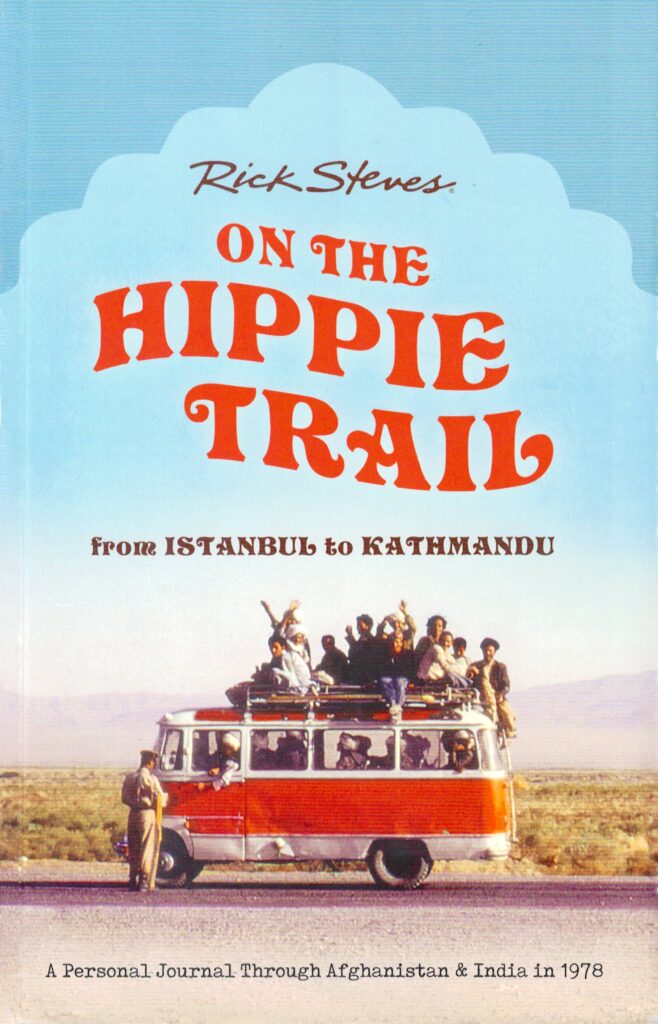I got this book as a gift for becoming a member of NORML. Or did I become a member of NORML to get the book? Either way, I’m glad I did. The book was an interesting read, and I’m happy to do a bit to help legalize and de-stigmatize responsible cannabis use.
At first glance, “normal” is an apt way to describe PBS travel nerd Rick Steves, at least from my middle-aged-white-American-dad perspective. His advice is as practical as his pants are khaki. He is the Ward Cleaver of travel journalism. While I regularly enjoy letting his informative jaunts through Europe lull me to sleep in the evening, I also vaguely distrust him for reasons I can’t quite identify. Is this dude for real?
But beneath that vanilla exterior, Rick Steves has, like, a few semi-sweet chocolate morsels. Morsel #1: His politics lean progressive, and he seems to be waging a decades-long campaign to red-pill affluent American liberals into embracing European-style social democracy. How? By giving them brief glimpses (via his long-running PBS series Rick Steves’ Europe) of people across the pond who look like cooler versions of themselves, and pay slightly higher taxes to enjoy a much higher overall standard of living. These people have it made. Their trains are dope, they drink wine with every meal, and if they happen to break a leg while skiing year-round, they’ll never see a hospital bill.
And speaking of dope, morsel #2 is more like a dank nugget: Rick Steves, apparently, loves weed. I learned about this a while back in an interview where he mentioned that he has kept a journal for forty years where he writes down the thoughts he has after getting high. He calls it “High Notes.” So I wasn’t totally surprised when I saw that he was partnering with NORML — the National Organization for the Reform of Marijuana Laws — to publish this travel memoir from 1978. It has “hippie” right in the title, and he’s literally going from Afghan Kush (Afganistan’s portion of the Hindu-Kush region), to a place that inspired a Zeppelin song (Kashmir), to what-may-well-be the cradle of Cannabis Indica’s noble lineage (India). You know he be getting high on that trip.
But what I didn’t know before picking it up was that this book would chronicle young Rick Steves’ first ever experiences with cannabis. At 23 in 1978, one of his stated intentions for this summer trip was to partake of the devil’s lettuce for the first time. After his much cooler friend Gene straight up bought some hash on the street in Afghanistan, they waited a few days for the right time, rolled a spliff, and proceeded to adjourn to another dimension. Actually, Rick writes that he didn’t feel much that first time, but the second time was LIT, and he and Gene ended up honored guests at an Afghan wedding.
Rick and Gene smoke up a few more times in the book, the last time on some prime Nepali ganja, and there’s an interesting progression in Rick’s attitude about what he’s doing. After the first positive experience, it’s kind of like: “I’m glad I tried that once.” Then, after crashing the wedding: “That was great, but this isn’t something to I’ll do regularly.” And finally, high in the Himalayas, “That was AMAZING and completely changed my appreciation of music.” It doesn’t take long to recognize that for some people, the experience of using cannabis can actually improve life in a variety of ways. I know it has for me.
To be honest, though, this book had almost nothing to do with weed. It is the travel journal of a young guy deliberately getting out of his comfort zone for a real adventure. Sure, he gets high a few times. He also sleeps on the floor of a filthy train compartment, takes a dump in the Shalimar Gardens, and gets so drunk on free cocktails on the flight back that he throws up three times. The young Rick Steves who went on this trip is a shockingly adventurous traveler. He is game for almost anything. When Gene is sick (frequently), Rick doesn’t hesitate to go out by himself, haggle with the rickshaw driver, and have tea with villagers who don’t speak a word of English. At other times, it is clear he is the same savvy traveler we know and love from PBS: using a money belt, aggressively seeking a deal, expertly planning currency exchanges.
Even at 23, Rick Steves was a hell of a travel writer. And after reading this book, I’m forced to admit maybe I judged him unfairly. Rick is for real. He has done adventure, he has thrown caution to the wind. He just prefers Europe, and that’s OK. After all, it’s possible that Rick Steves may end up being the reason America eventually has universal health care, guaranteed paid family leave, and legal weed at the federal level.
